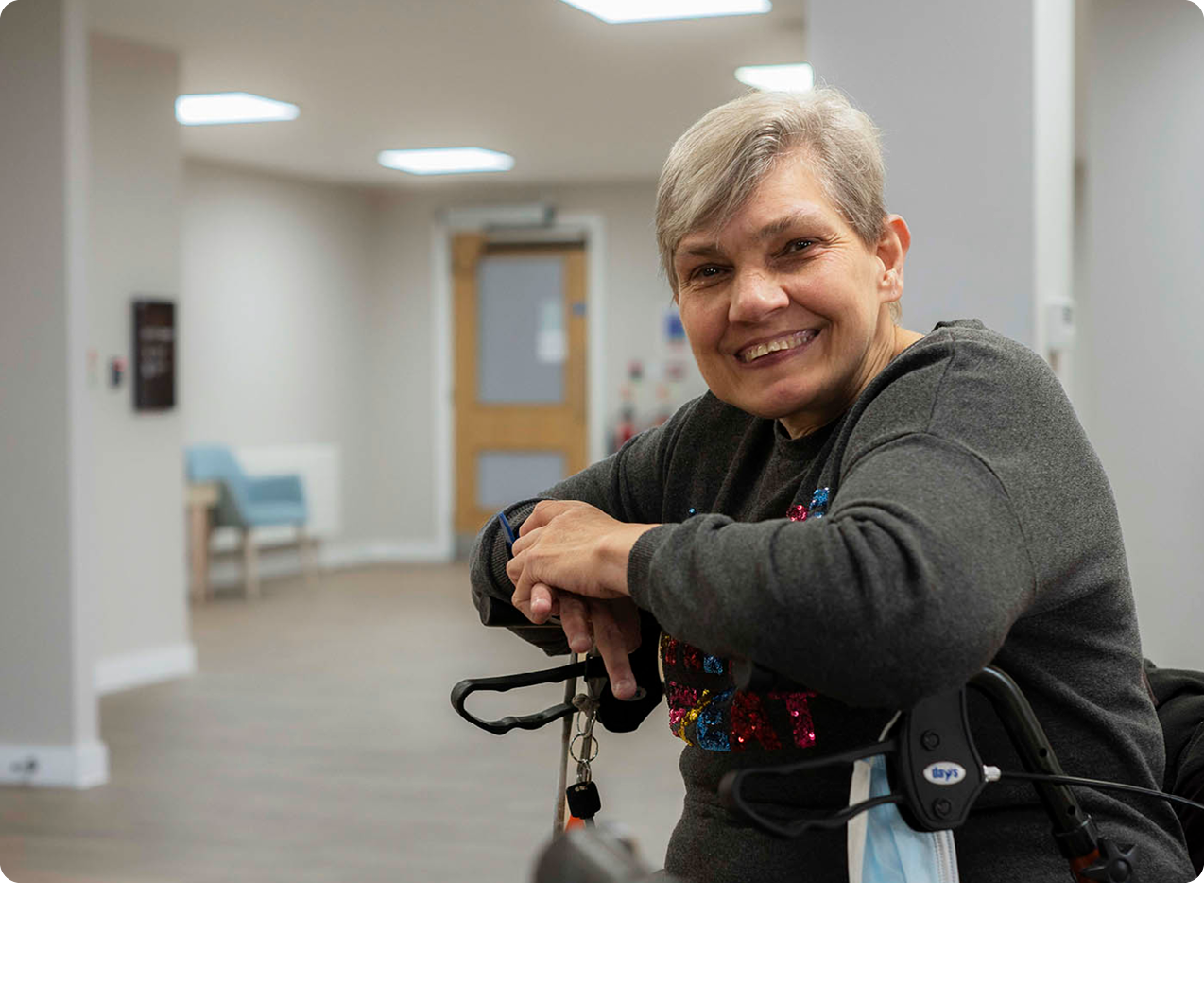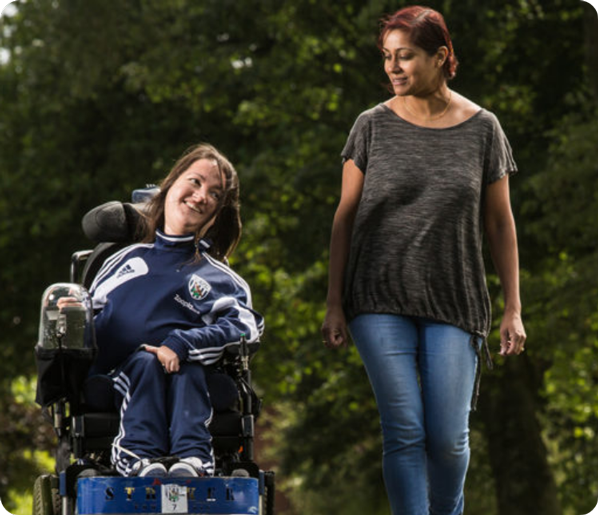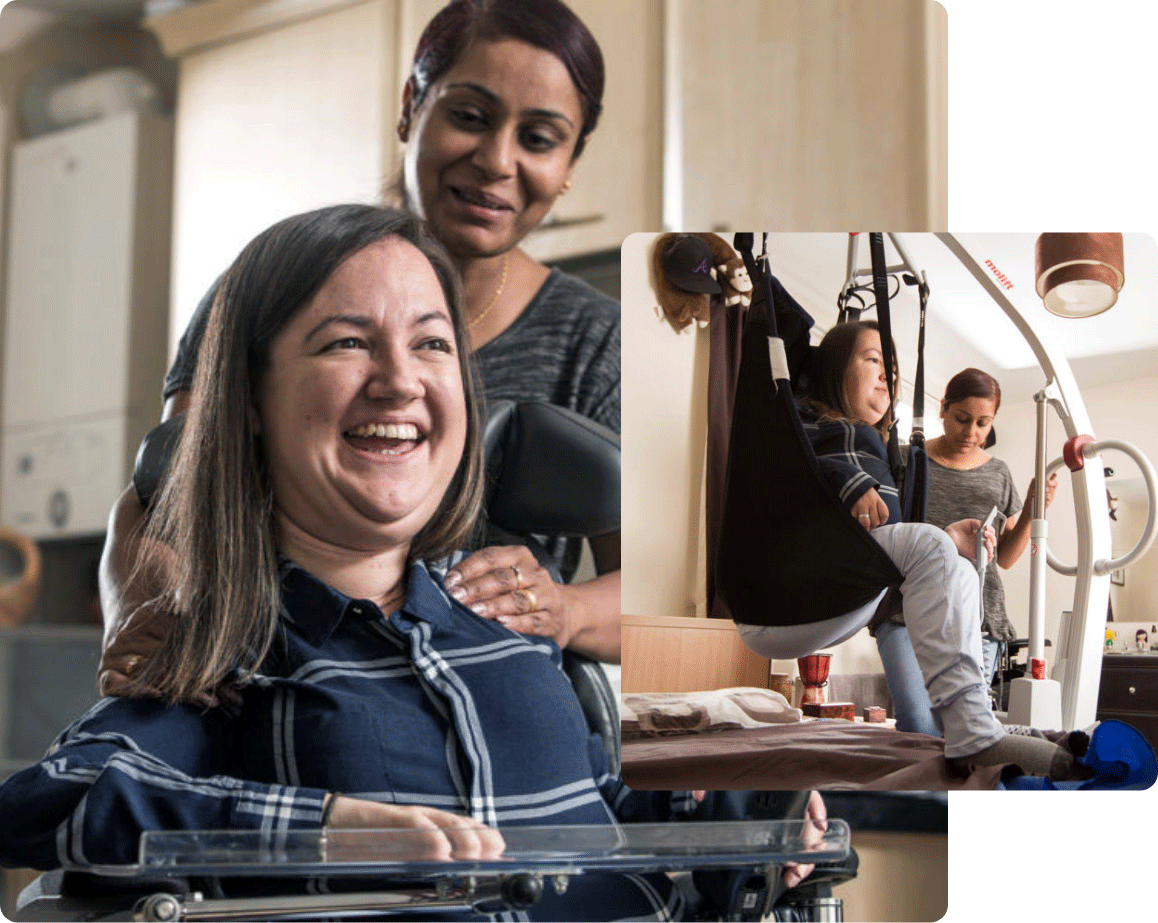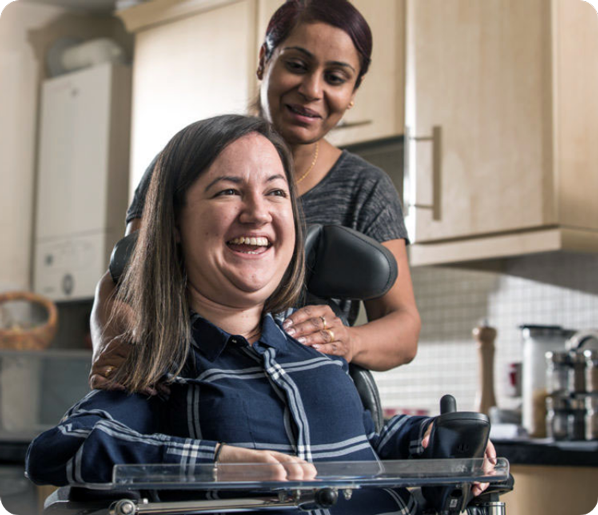We use cookies on our website.
Some of them are necessary for the functioning of the site, but you can decide about others.
People receiving complex care usually have long-term health conditions, such as spinal injuries or neurological issues. Clients are dependent on specially-trained carers and need ongoing intensive specialist support.


Care planning is based on a thorough assessment and understanding of the person needing care, who will often be returning home from hospital or a rehabilitation facility. Health and social care teams, including physiotherapists, occupational therapists, nurses and social care managers work together with the individual and their family members as appropriate to plan a care package to meet the person’s needs, whether basic physical, social or emotional, or more complex or medical.


Working in complex care, you’ll support a person with activities of daily living that they can’t manage alone. This could include support with washing and dressing – aiming to help your client look after themselves in the way that they would if they were able to. Supporting someone to eat is also a really important part of a care assistant’s role, along with assisting with mobility and continence.


Helping your clients to maintain the lifestyle with which they are familiar and comfortable is also really important. They’ll appreciate support to maintain relationships with their family and friends and to achieve goals with social interests, education and even career ambitions. As a care assistant providing complex care, you’ll be part of a large, multi-disciplinary team who help create the best possible quality of life for their clients.


Complete Care Amegreen is part of City & County Healthcare Group. You’ll have access to all the resources, career pathways, benefits, investments, opportunities, and security that being part of City...
We’re creating brighter days. Fresh challenges. Exciting opportunities. Plenty of ups, downs, and curveballs. With a career as a Care Assistant at City & County for every day will be different to th...
We’re creating brighter days. Fresh challenges. Exciting opportunities. Plenty of ups, downs, and curveballs. With a career as a Care Assistant at City & County for every day will be different to th...
We’re creating brighter days. Fresh challenges. Exciting opportunities. Plenty of ups, downs, and curveballs. With a career as a Care Assistant at City & County for every day will be different to th...
We’re creating brighter days. Fresh challenges. Exciting opportunities. Plenty of ups, downs, and curveballs. With a career as a Care Assistant at City & County, every day will be different to the n...
We’re creating brighter days. Fresh challenges. Exciting opportunities. Plenty of ups, downs, and curveballs. With a career as a Care Assistant at City & County for every day will be different to th...
We’re creating brighter days. Fresh challenges. Exciting opportunities. Plenty of ups, downs, and curveballs. With a career as a Care Assistant at City & County for every day will be different to th...
We’re creating brighter days. Fresh challenges. Exciting opportunities. Plenty of ups, downs, and curveballs. With a career as a Care Assistant at City & County for every day will be different to th...
We’re creating brighter days. Fresh challenges. Exciting opportunities. Plenty of ups, downs, and curveballs. With a career as a Care Assistant at City & County for every day will be different to th...
We’re creating brighter days. Fresh challenges. Exciting opportunities. Plenty of ups, downs, and curveballs. With a career as a Care Assistant at City & County for every day will be different to th...
We’re creating brighter days. Fresh challenges. Exciting opportunities. Plenty of ups, downs, and curveballs. With a career as a Care Assistant at City & County for every day will be different to th...
We’re creating brighter days. Fresh challenges. Exciting opportunities. Plenty of ups, downs, and curveballs. With a career as a Care Assistant at City & County for every day will be different to th...
We’re creating brighter days. Fresh challenges. Exciting opportunities. Plenty of ups, downs, and curveballs. With a career as a Care Assistant at City & County for every day will be different to th...
We’re creating brighter days. Fresh challenges. Exciting opportunities. Plenty of ups, downs, and curveballs. With a career as a Care Assistant at City & County for every day will be different to th...
We’re creating brighter days. Fresh challenges. Exciting opportunities. Plenty of ups, downs, and curveballs. With a career as a Care Assistant at City & County for every day will be different to th...
We’re creating brighter days. Fresh challenges. Exciting opportunities. Plenty of ups, downs, and curveballs. With a career as a Care Assistant at City & County for every day will be different to th...
Every day brings something new. Join us as a Care Assistant and make a real difference—one day, one person, one moment at a time. Expect meaningful work, real rewards, and a career that grows with y...
We’re creating brighter days. Fresh challenges. Exciting opportunities. Plenty of ups, downs, and curveballs. With a career as a Care Assistant at City & County for every day will be different to th...
We’re creating brighter days. Fresh challenges. Exciting opportunities. Plenty of ups, downs, and curveballs. With a career as a Care Assistant at City & County for every day will be different to th...
We’re creating brighter days. Fresh challenges. Exciting opportunities. Plenty of ups, downs, and curveballs. With a career as a Care Assistant at City & County for every day will be different to th...
We’re creating brighter days. Fresh challenges. Exciting opportunities. Plenty of ups, downs, and curveballs. With a career as a Care Assistant at City & County for every day will be different to th...
We’re creating brighter days. Fresh challenges. Exciting opportunities. Plenty of ups, downs, and curveballs. With a career as a Care Assistant at City & County for every day will be different to th...
We’re creating brighter days. Fresh challenges. Exciting opportunities. Plenty of ups, downs, and curveballs. With a career as a Care Assistant at City & County for every day will be different to th...
We’re creating brighter days. Fresh challenges. Exciting opportunities. Plenty of ups, downs, and curveballs. With a career as a Care Assistant at City & County for every day will be different to th...
We’re creating brighter days. Fresh challenges. Exciting opportunities. Plenty of ups, downs, and curveballs. With a career as a Care Assistant at Comfort Call, every day will be different to the ne...
We’re creating brighter days. Fresh challenges. Exciting opportunities. Plenty of ups, downs and curveballs. With a career as a Field Care Supervisor at Comfort Call, every day will be different to ...
We’re creating brighter days. Fresh challenges. Exciting opportunities. Plenty of ups, downs, and curveballs. With a career as a Care Assistant at City & County for every day will be different to th...
We’re creating brighter days. Fresh challenges. Exciting opportunities. Plenty of ups, downs, and curveballs. With a career as a Care Assistant at City & County for every day will be different to th...
We’re creating brighter days. Fresh challenges. Exciting opportunities. Plenty of ups, downs, and curveballs. With a career as a Care Assistant at City & County for every day will be different to th...
We’re creating brighter days. Fresh challenges. Exciting opportunities. Plenty of ups, downs, and curveballs. With a career as a Care Assistant at City & County for every day will be different to th...
We’re creating brighter days. Fresh challenges. Exciting opportunities. Plenty of ups, downs, and curveballs. With a career as a Care Assistant at City & County for every day will be different to th...
We’re creating brighter days. Fresh challenges. Exciting opportunities. Plenty of ups, downs, and curveballs. With a career as a Care Assistant at City & County for every day will be different to th...
We’re creating brighter days. Fresh challenges. Exciting opportunities. Plenty of ups, downs, and curveballs. With a career as a Care Assistant at City & County for every day will be different to th...
We’re creating brighter days. Fresh challenges. Exciting opportunities. Plenty of ups, downs, and curveballs. With a career as a Care Assistant at City & County for every day will be different to th...
We’re creating brighter days. Fresh challenges. Exciting opportunities. Plenty of ups, downs, and curveballs. With a career as a Care Assistant at City & County for every day will be different to th...
We’re creating brighter days. Fresh challenges. Exciting opportunities. Plenty of ups, downs, and curveballs. With a career as a Care Assistant at City & County for every day will be different to th...
We’re creating brighter days. Fresh challenges. Exciting opportunities. Plenty of ups, downs, and curveballs. With a career as a Care Assistant at City & County for every day will be different to th...
We’re creating brighter days. Fresh challenges. Exciting opportunities. Plenty of ups, downs, and curveballs. With a career as a Care Assistant at City & County for every day will be different to th...
We’re creating brighter days. Fresh challenges. Exciting opportunities. Plenty of ups, downs, and curveballs. With a career as a Care Assistant at City & County for every day will be different to th...
We’re creating brighter days. Fresh challenges. Exciting opportunities. Plenty of ups, downs, and curveballs. With a career as a Care Assistant at City & County for every day will be different to th...
We’re creating brighter days. Fresh challenges. Exciting opportunities. Plenty of ups, downs, and curveballs. With a career as a Care Assistant at City & County for every day will be different to th...
We’re creating brighter days. Fresh challenges. Exciting opportunities. Plenty of ups, downs, and curveballs. With a career as a Care Assistant at City & County for every day will be different to th...
We’re creating brighter days. Fresh challenges. Exciting opportunities. Plenty of ups, downs, and curveballs. With a career as a Care Assistant at City & County for every day will be different to th...
We’re creating brighter days. Fresh challenges. Exciting opportunities. Plenty of ups, downs, and curveballs. With a career as a Care Assistant at City & County for every day will be different to th...
We’re creating brighter days. Fresh challenges. Exciting opportunities. Plenty of ups, downs, and curveballs. With a career as a Care Assistant at City & County for every day will be different to th...
We’re creating brighter days. Fresh challenges. Exciting opportunities. Plenty of ups, downs, and curveballs. With a career as a Care Assistant at City & County for every day will be different to th...
We’re creating brighter days. Fresh challenges. Exciting opportunities. Plenty of ups, downs, and curveballs. With a career as a Care Assistant at City & County for every day will be different to th...
We’re creating brighter days. Fresh challenges. Exciting opportunities. Plenty of ups, downs, and curveballs. With a career as a Care Assistant at City and County Healthcare Group, every day will be...
We’re creating brighter days. Fresh challenges. Exciting opportunities. Plenty of ups, downs, and curveballs. With a career as a Care Assistant at City & County for every day will be different to th...
We’re creating brighter days. Fresh challenges. Exciting opportunities. Plenty of ups, downs, and curveballs. With a career as a Care Assistant at City & County for every day will be different to th...
We’re creating brighter days. Fresh challenges. Exciting opportunities. Plenty of ups, downs, and curveballs. With a career as a Care Assistant at City & County for every day will be different to th...
We’re creating brighter days. Fresh challenges. Exciting opportunities. Plenty of ups, downs, and curveballs. With a career as a Care Assistant at City & County for every day will be different to th...
We’re creating brighter days. Fresh challenges. Exciting opportunities. Plenty of ups, downs, and curveballs. With a career as a Care Assistant at City & County for every day will be different to th...
We’re creating brighter days. Fresh challenges. Exciting opportunities. Plenty of ups, downs, and curveballs. With a career as a Care Assistant at City & County for every day will be different to th...
We’re creating brighter days. Fresh challenges. Exciting opportunities. Plenty of ups, downs, and curveballs. With a career as a Care Assistant at City & County for every day will be different to th...
We are CCH. With 14,000 colleagues across 32 care companies, we have one purpose: to make sure no one in need of care is ever forgotten or left behind. We’re not only changing lives, we’re transfo...
We are CCH. With 14,000 colleagues across 32 care companies, we have one purpose: to make sure no one in need of care is ever forgotten or left behind. We’re not only changing lives, we’re transfo...
We’re creating brighter days. Fresh challenges. Exciting opportunities. Plenty of ups, downs, and curveballs. With a career as a Care Assistant at City & County for every day will be different to th...
We’re creating brighter days. Fresh challenges. Exciting opportunities. Plenty of ups, downs, and curveballs. With a career as a Care Assistant at City & County for every day will be different to th...
We’re creating brighter days. Fresh challenges. Exciting opportunities. Plenty of ups, downs, and curveballs. With a career as a Care Assistant at City & County for every day will be different to th...
We’re creating brighter days. Fresh challenges. Exciting opportunities. Plenty of ups, downs, and curveballs. With a career as a Care Assistant at City & County for every day will be different to th...
We’re creating brighter days. Fresh challenges. Exciting opportunities. Plenty of ups, downs, and curveballs. With a career as a Care Assistant at City & County for every day will be different to th...
We’re creating brighter days. Fresh challenges. Exciting opportunities. Plenty of ups, downs, and curveballs. With a career as a Care Assistant at City & County for every day will be different to th...
We’re creating brighter days. Fresh challenges. Exciting opportunities. Plenty of ups, downs, and curveballs. With a career as a Care Assistant at City & County for every day will be different to th...
We’re creating brighter days. Fresh challenges. Exciting opportunities. Plenty of ups, downs, and curveballs. With a career as a Care Assistant at City & County for every day will be different to th...
We’re creating brighter days. Fresh challenges. Exciting opportunities. Plenty of ups, downs, and curveballs. With a career as a Care Assistant at City & County for every day will be different to th...
We’re creating brighter days. Fresh challenges. Exciting opportunities. Plenty of ups, downs, and curveballs. With a career as a Care Assistant at City & County for every day will be different to th...
We’re creating brighter days. Fresh challenges. Exciting opportunities. Plenty of ups, downs, and curveballs. With a career as a Care Assistant at City & County for every day will be different to th...
We’re creating brighter days. Fresh challenges. Exciting opportunities. Plenty of ups, downs, and curveballs. With a career as a Care Assistant at City & County for every day will be different to th...
We’re creating brighter days. Fresh challenges. Exciting opportunities. Plenty of ups, downs, and curveballs. With a career as a Care Assistant at City & County for every day will be different to th...
We’re creating brighter days. Fresh challenges. Exciting opportunities. Plenty of ups, downs, and curveballs. With a career as a Care Assistant at City & County for every day will be different to th...
We’re creating brighter days. Fresh challenges. Exciting opportunities. Plenty of ups, downs, and curveballs. With a career as a Care Assistant at City & County for every day will be different to th...
We’re creating brighter days. Fresh challenges. Exciting opportunities. Plenty of ups, downs, and curveballs. With a career as a Care Assistant at City & County for every day will be different to th...
We’re creating brighter days. Fresh challenges. Exciting opportunities. Plenty of ups, downs, and curveballs. With a career as a Care Assistant at City & County for every day will be different to th...
We’re creating brighter days. Fresh challenges. Exciting opportunities. Plenty of ups, downs, and curveballs. With a career as a Care Assistant at City & County for every day will be different to th...
Complete Care Amegreen is part of City & County Healthcare Group. You’ll have access to all the resources, career pathways, benefits, investments, opportunities, and security that being part of City...
We’re creating brighter days. Fresh challenges. Exciting opportunities. Plenty of ups, downs, and curveballs. With a career as a Care Assistant at City & County for every day will be different to th...
We’re creating brighter days. Fresh challenges. Exciting opportunities. Plenty of ups, downs, and curveballs. With a career as a Care Assistant at City & County for every day will be different to th...
We’re creating brighter days. Fresh challenges. Exciting opportunities. Plenty of ups, downs, and curveballs. With a career as a Care Assistant at City & County for every day will be different to th...
We’re creating brighter days. Fresh challenges. Exciting opportunities. Plenty of ups, downs, and curveballs. With a career as a Care Assistant at City & County, every day will be different to the n...
We’re creating brighter days. Fresh challenges. Exciting opportunities. Plenty of ups, downs, and curveballs. With a career as a Care Assistant at City & County for every day will be different to th...
We’re creating brighter days. Fresh challenges. Exciting opportunities. Plenty of ups, downs, and curveballs. With a career as a Care Assistant at City & County for every day will be different to th...
We’re creating brighter days. Fresh challenges. Exciting opportunities. Plenty of ups, downs, and curveballs. With a career as a Care Assistant at City & County for every day will be different to th...
We’re creating brighter days. Fresh challenges. Exciting opportunities. Plenty of ups, downs, and curveballs. With a career as a Care Assistant at City & County for every day will be different to th...
We’re creating brighter days. Fresh challenges. Exciting opportunities. Plenty of ups, downs, and curveballs. With a career as a Care Assistant at City & County for every day will be different to th...
We’re creating brighter days. Fresh challenges. Exciting opportunities. Plenty of ups, downs, and curveballs. With a career as a Care Assistant at City & County for every day will be different to th...
We’re creating brighter days. Fresh challenges. Exciting opportunities. Plenty of ups, downs, and curveballs. With a career as a Care Assistant at City & County for every day will be different to th...
We’re creating brighter days. Fresh challenges. Exciting opportunities. Plenty of ups, downs, and curveballs. With a career as a Care Assistant at City & County for every day will be different to th...
We’re creating brighter days. Fresh challenges. Exciting opportunities. Plenty of ups, downs, and curveballs. With a career as a Care Assistant at City & County for every day will be different to th...
We’re creating brighter days. Fresh challenges. Exciting opportunities. Plenty of ups, downs, and curveballs. With a career as a Care Assistant at City & County for every day will be different to th...
We’re creating brighter days. Fresh challenges. Exciting opportunities. Plenty of ups, downs, and curveballs. With a career as a Care Assistant at City & County for every day will be different to th...
Every day brings something new. Join us as a Care Assistant and make a real difference—one day, one person, one moment at a time. Expect meaningful work, real rewards, and a career that grows with y...
We’re creating brighter days. Fresh challenges. Exciting opportunities. Plenty of ups, downs, and curveballs. With a career as a Care Assistant at City & County for every day will be different to th...
We’re creating brighter days. Fresh challenges. Exciting opportunities. Plenty of ups, downs, and curveballs. With a career as a Care Assistant at City & County for every day will be different to th...
We’re creating brighter days. Fresh challenges. Exciting opportunities. Plenty of ups, downs, and curveballs. With a career as a Care Assistant at City & County for every day will be different to th...
We’re creating brighter days. Fresh challenges. Exciting opportunities. Plenty of ups, downs, and curveballs. With a career as a Care Assistant at City & County for every day will be different to th...
We’re creating brighter days. Fresh challenges. Exciting opportunities. Plenty of ups, downs, and curveballs. With a career as a Care Assistant at City & County for every day will be different to th...
We’re creating brighter days. Fresh challenges. Exciting opportunities. Plenty of ups, downs, and curveballs. With a career as a Care Assistant at City & County for every day will be different to th...
We’re creating brighter days. Fresh challenges. Exciting opportunities. Plenty of ups, downs, and curveballs. With a career as a Care Assistant at City & County for every day will be different to th...
We’re creating brighter days. Fresh challenges. Exciting opportunities. Plenty of ups, downs, and curveballs. With a career as a Care Assistant at Comfort Call, every day will be different to the ne...
We’re creating brighter days. Fresh challenges. Exciting opportunities. Plenty of ups, downs and curveballs. With a career as a Field Care Supervisor at Comfort Call, every day will be different to ...
We’re creating brighter days. Fresh challenges. Exciting opportunities. Plenty of ups, downs, and curveballs. With a career as a Care Assistant at City & County for every day will be different to th...
We’re creating brighter days. Fresh challenges. Exciting opportunities. Plenty of ups, downs, and curveballs. With a career as a Care Assistant at City & County for every day will be different to th...
We’re creating brighter days. Fresh challenges. Exciting opportunities. Plenty of ups, downs, and curveballs. With a career as a Care Assistant at City & County for every day will be different to th...
We’re creating brighter days. Fresh challenges. Exciting opportunities. Plenty of ups, downs, and curveballs. With a career as a Care Assistant at City & County for every day will be different to th...
We’re creating brighter days. Fresh challenges. Exciting opportunities. Plenty of ups, downs, and curveballs. With a career as a Care Assistant at City & County for every day will be different to th...
We’re creating brighter days. Fresh challenges. Exciting opportunities. Plenty of ups, downs, and curveballs. With a career as a Care Assistant at City & County for every day will be different to th...
We’re creating brighter days. Fresh challenges. Exciting opportunities. Plenty of ups, downs, and curveballs. With a career as a Care Assistant at City & County for every day will be different to th...
We’re creating brighter days. Fresh challenges. Exciting opportunities. Plenty of ups, downs, and curveballs. With a career as a Care Assistant at City & County for every day will be different to th...
We’re creating brighter days. Fresh challenges. Exciting opportunities. Plenty of ups, downs, and curveballs. With a career as a Care Assistant at City & County for every day will be different to th...
We’re creating brighter days. Fresh challenges. Exciting opportunities. Plenty of ups, downs, and curveballs. With a career as a Care Assistant at City & County for every day will be different to th...
We’re creating brighter days. Fresh challenges. Exciting opportunities. Plenty of ups, downs, and curveballs. With a career as a Care Assistant at City & County for every day will be different to th...
We’re creating brighter days. Fresh challenges. Exciting opportunities. Plenty of ups, downs, and curveballs. With a career as a Care Assistant at City & County for every day will be different to th...
We’re creating brighter days. Fresh challenges. Exciting opportunities. Plenty of ups, downs, and curveballs. With a career as a Care Assistant at City & County for every day will be different to th...
We’re creating brighter days. Fresh challenges. Exciting opportunities. Plenty of ups, downs, and curveballs. With a career as a Care Assistant at City & County for every day will be different to th...
We’re creating brighter days. Fresh challenges. Exciting opportunities. Plenty of ups, downs, and curveballs. With a career as a Care Assistant at City & County for every day will be different to th...
We’re creating brighter days. Fresh challenges. Exciting opportunities. Plenty of ups, downs, and curveballs. With a career as a Care Assistant at City & County for every day will be different to th...
We’re creating brighter days. Fresh challenges. Exciting opportunities. Plenty of ups, downs, and curveballs. With a career as a Care Assistant at City & County for every day will be different to th...
We’re creating brighter days. Fresh challenges. Exciting opportunities. Plenty of ups, downs, and curveballs. With a career as a Care Assistant at City & County for every day will be different to th...
We’re creating brighter days. Fresh challenges. Exciting opportunities. Plenty of ups, downs, and curveballs. With a career as a Care Assistant at City & County for every day will be different to th...
We’re creating brighter days. Fresh challenges. Exciting opportunities. Plenty of ups, downs, and curveballs. With a career as a Care Assistant at City & County for every day will be different to th...
We’re creating brighter days. Fresh challenges. Exciting opportunities. Plenty of ups, downs, and curveballs. With a career as a Care Assistant at City & County for every day will be different to th...
We’re creating brighter days. Fresh challenges. Exciting opportunities. Plenty of ups, downs, and curveballs. With a career as a Care Assistant at City and County Healthcare Group, every day will be...
We’re creating brighter days. Fresh challenges. Exciting opportunities. Plenty of ups, downs, and curveballs. With a career as a Care Assistant at City & County for every day will be different to th...
We’re creating brighter days. Fresh challenges. Exciting opportunities. Plenty of ups, downs, and curveballs. With a career as a Care Assistant at City & County for every day will be different to th...
We’re creating brighter days. Fresh challenges. Exciting opportunities. Plenty of ups, downs, and curveballs. With a career as a Care Assistant at City & County for every day will be different to th...
We’re creating brighter days. Fresh challenges. Exciting opportunities. Plenty of ups, downs, and curveballs. With a career as a Care Assistant at City & County for every day will be different to th...
We’re creating brighter days. Fresh challenges. Exciting opportunities. Plenty of ups, downs, and curveballs. With a career as a Care Assistant at City & County for every day will be different to th...
We’re creating brighter days. Fresh challenges. Exciting opportunities. Plenty of ups, downs, and curveballs. With a career as a Care Assistant at City & County for every day will be different to th...
We’re creating brighter days. Fresh challenges. Exciting opportunities. Plenty of ups, downs, and curveballs. With a career as a Care Assistant at City & County for every day will be different to th...
We are CCH. With 14,000 colleagues across 32 care companies, we have one purpose: to make sure no one in need of care is ever forgotten or left behind. We’re not only changing lives, we’re transfo...
We are CCH. With 14,000 colleagues across 32 care companies, we have one purpose: to make sure no one in need of care is ever forgotten or left behind. We’re not only changing lives, we’re transfo...
We’re creating brighter days. Fresh challenges. Exciting opportunities. Plenty of ups, downs, and curveballs. With a career as a Care Assistant at City & County for every day will be different to th...
We’re creating brighter days. Fresh challenges. Exciting opportunities. Plenty of ups, downs, and curveballs. With a career as a Care Assistant at City & County for every day will be different to th...
We’re creating brighter days. Fresh challenges. Exciting opportunities. Plenty of ups, downs, and curveballs. With a career as a Care Assistant at City & County for every day will be different to th...
We’re creating brighter days. Fresh challenges. Exciting opportunities. Plenty of ups, downs, and curveballs. With a career as a Care Assistant at City & County for every day will be different to th...
We’re creating brighter days. Fresh challenges. Exciting opportunities. Plenty of ups, downs, and curveballs. With a career as a Care Assistant at City & County for every day will be different to th...
We’re creating brighter days. Fresh challenges. Exciting opportunities. Plenty of ups, downs, and curveballs. With a career as a Care Assistant at City & County for every day will be different to th...
We’re creating brighter days. Fresh challenges. Exciting opportunities. Plenty of ups, downs, and curveballs. With a career as a Care Assistant at City & County for every day will be different to th...
We’re creating brighter days. Fresh challenges. Exciting opportunities. Plenty of ups, downs, and curveballs. With a career as a Care Assistant at City & County for every day will be different to th...
We’re creating brighter days. Fresh challenges. Exciting opportunities. Plenty of ups, downs, and curveballs. With a career as a Care Assistant at City & County for every day will be different to th...
We’re creating brighter days. Fresh challenges. Exciting opportunities. Plenty of ups, downs, and curveballs. With a career as a Care Assistant at City & County for every day will be different to th...
We’re creating brighter days. Fresh challenges. Exciting opportunities. Plenty of ups, downs, and curveballs. With a career as a Care Assistant at City & County for every day will be different to th...
We’re creating brighter days. Fresh challenges. Exciting opportunities. Plenty of ups, downs, and curveballs. With a career as a Care Assistant at City & County for every day will be different to th...
We’re creating brighter days. Fresh challenges. Exciting opportunities. Plenty of ups, downs, and curveballs. With a career as a Care Assistant at City & County for every day will be different to th...
We’re creating brighter days. Fresh challenges. Exciting opportunities. Plenty of ups, downs, and curveballs. With a career as a Care Assistant at City & County for every day will be different to th...
We’re creating brighter days. Fresh challenges. Exciting opportunities. Plenty of ups, downs, and curveballs. With a career as a Care Assistant at City & County for every day will be different to th...
We’re creating brighter days. Fresh challenges. Exciting opportunities. Plenty of ups, downs, and curveballs. With a career as a Care Assistant at City & County for every day will be different to th...
We’re creating brighter days. Fresh challenges. Exciting opportunities. Plenty of ups, downs, and curveballs. With a career as a Care Assistant at City & County for every day will be different to th...
We’re creating brighter days. Fresh challenges. Exciting opportunities. Plenty of ups, downs, and curveballs. With a career as a Care Assistant at City & County for every day will be different to th...
We use cookies on our website.
Some of them are necessary for the functioning of the site, but you can decide about others.
[We do not share the information collected by the cookies with any third parties.]
You can choose which analytical, functionality and targeting cookies we can set by clicking on the button(s):
However, if you use your browser settings to block all cookies (including essential cookies) you may not be able to access all or parts of our website.
Except for essential cookies, all cookies will expire after 365 days.